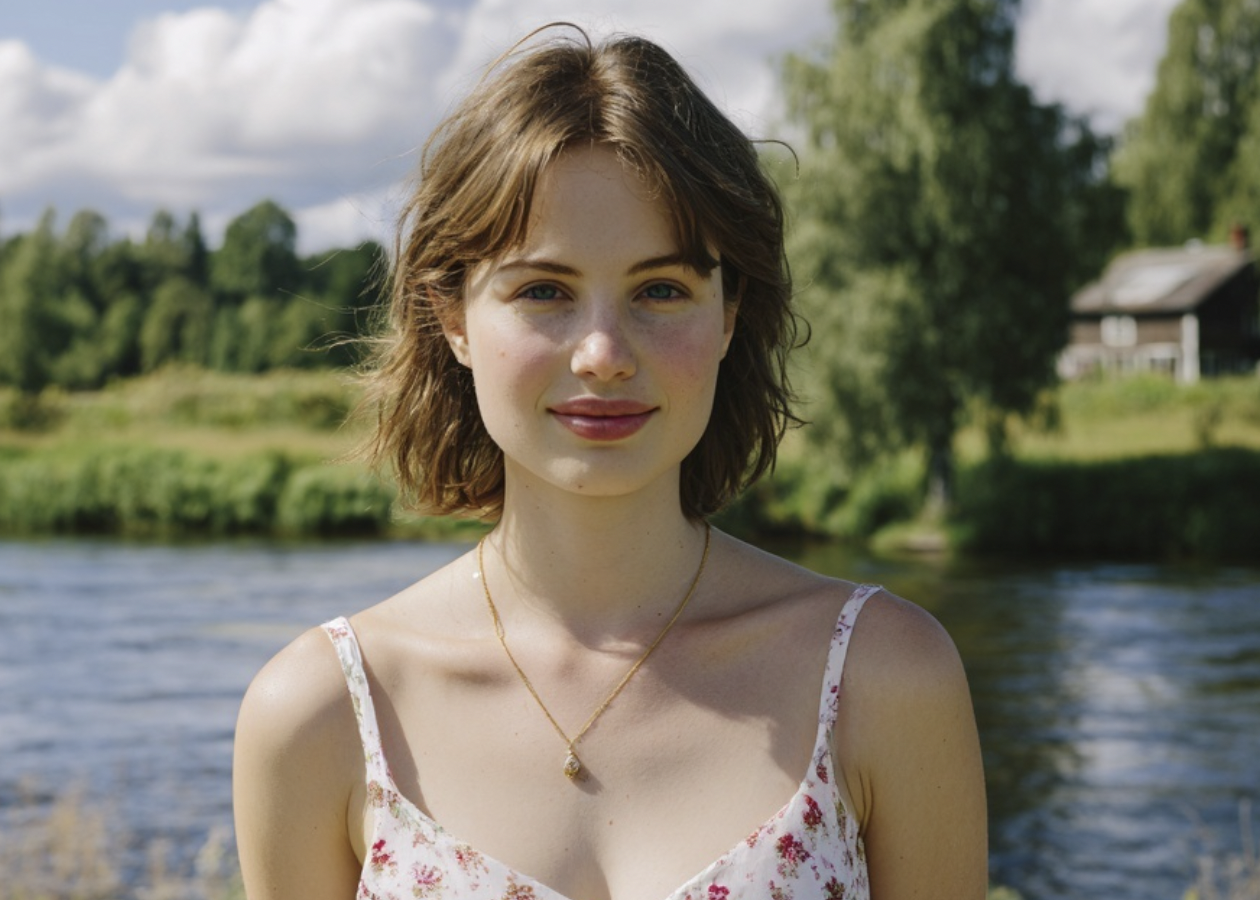Silence in her soul was her very first memory. Not the silence of peace, but the silence of an emptied nest, the echo of which remained forever. Alisa didn’t remember faces, didn’t remember voices. Only scraps of notions: “geologists,” “mountains,” “rockslide.” And an endless, piercing sense of loss, absorbed with the very milk she’d also lacked. She was a tiny island broken off from a great continent and lost in the stormy ocean of the foster system.
How she ended up in the orphanage called “Nadezhda” (“Hope”) had also been erased by a mind protecting a fragile child’s psyche. She only knew that she had no family left. Or perhaps there was some second cousin somewhere, but not everyone can shoulder the burden of someone else’s tragedy. Not everyone has the heart to take into their family the eternally sad eyes of a girl who at night clutched a tattered photograph of strangers against a backdrop of stern mountain peaks.
Her only anchor in this world became the orphanage cook—Marfa Semyonovna. She was like a kind, skillful fairy reigning over a kingdom of appetizing smells: the air was scented with vanilla, fresh pastries, rich shchi, and something ineffably homelike. Alisa was always underfoot around her, like Tom Thumb circling a giant, soaking up every movement, every tip.
“Come here, my little goldfish,” Marfa Semyonovna would call in a thick, honeyed voice. Her hands, rough from work yet unbelievably gentle in their caress, would slip into the girl’s palm a still-warm, rosy vatrushka (a sweet cheese bun), or two caramels gleaming like gemstones. “Have a bite—you’re growing.”
“Thank you, Aunt Marfa! I love you so much! You’re the very, very best!” came the bright reply, and the girl, happy, would press herself to her broad side, breathing in the dear scent of yeast and kindness.
A love of cooking grew in her day by day. Whether it was genes breaking through to the surface or the magic that Marfa Semyonovna generously shared as she quietly taught her the craft—how to knead the perfect dough so it “breathes,” how to tell by sound when a pie is done, how to season a soup with bay leaf and love—no one could say. Sometimes, on big holidays or just on a weekend, the cook would take the girl to her own small, cozy apartment filled with clay pots of geraniums.
“Well, Alisochka, I begged permission from our Anna Viktorovna. Want to come visit me? For cabbage pies?”
“Of course I do!” The girl shone like a New Year’s tree, and her small hand disappeared completely in Marfa Semyonovna’s large, reliable one.
The walk felt like a journey into another universe. Once through the orphanage gates, Alisa opened her eyes wide: here was a shop window, there a little square with pigeons, and everywhere simply people going about their business. Everything was full of meaning and freedom. And at Aunt Marfa’s home it smelled of old wood, dried herbs, and pure happiness.
Sitting in the kitchen with a mug of tea and raspberry jam, Marfa Semyonovna often sighed, an unspilled tear glimmering in her eyes.
“Ah, child, my treasure… I’d carry you with me forever. But my age, curse that it is, won’t let me take you into my care. They won’t allow it…”
Alisa was already finishing school, preparing in earnest for her exams, building plans she and Aunt Marfa had cherished together, when the irreparable happened. The cook’s huge, kind heart stopped. A heart attack. The ambulance had been called too late. Alisa’s world collapsed again, losing its main pillar, its magnet, its warmest corner. She wept quietly, like an adult, because screaming was useless now.
But the strength instilled in her by that very woman kept her from breaking. After school, gritting her teeth and brushing away her tears, Alisa submitted her documents to a culinary college. It had been their shared dream. And when the cherished envelope arrived with the notice of admission, the first place she went was the cemetery.
She sat on the cold ground by the modest headstone, stroking the rough granite, and told it:
“See, Aunt Marfa, just like we wanted. I got in. I’ll study and I’ll cook like you. I’ll be the best chef. I’ll fulfill your dream and mine. I promise. Thank you for everything.”
Years of study passed, filled with hard work. And then Alisa, now a certified cook, began her practicum at the prestigious restaurant “Grand-Chef.” She poured her whole soul into every dish, all the unused love that had been building up for years. And one day, as she was laying out the elements of a dessert with filigree precision, the head chef came in.
“Alisa, a guest would like to speak with you. Table five.”
Her heart sank into her shoes. One thought: a complaint. She’d undersalted, over-peppered, failed to please. With palms damp from nerves and trembling knees, she stepped into the dining room. By the window sat a young man. Not merely handsome—he had that intelligent, luminous kind of beauty that shines from within. And he was looking at her not with reproach but with such admiration that Alisa’s breath caught.
“Good afternoon! Allow me to introduce myself—Stepan. And you are?”
“Alisa,” she whispered, and the voice sounded foreign to her.
“Alisa…” he said, as if tasting a rare wine. “A magnificent name. And forgive the high-flown tone, but you have magic hands. I mean it. That truffle soup… I’ve traveled half of Europe, and I’ve never tasted such flavor, such depth… This is not just food. This is art. You are incredibly talented.”
It felt like a dream. Bright, vivid, fragrant with truffles and hope. She lowered her eyes, abashed.
“Oh, it’s nothing… I just cook the way I was taught…”
But the very spark had already leapt between them, almost tangible. Her heart, accustomed to the rhythm of solitude, started beating in a new, exultant tempo.
“Alisa, I know this is a bit sudden… But what if I ask you out for a walk? Today, after your shift? If you don’t mind and have the time,” he tilted his head a little, and his eyes held unfeigned sincerity.
Her heart pounded so hard it seemed it could be heard even over the restaurant’s noise.
“No, I don’t mind. I can make time,” she answered far more confidently than she felt inside.
And so it began. Stepan turned out to be a fascinating conversationalist. He was a graduate student in history, earning extra money as a tutor.
“A humanist to my fingertips—unlike you, a creator and enchantress,” he joked.
They dated for about half a year—six months of absolute happiness—when Stepan, holding her hand in his, said:
“Tomorrow we’ll go to my place. I’ll introduce you to my mother.”
A cold stream of fear ran down her back.
“Stepa, isn’t it too soon? I’m… I’m scared. I know how these things go…”
“Don’t be afraid, my little scaredy-cat,” he touched her cheek tenderly. “I’m with you. It’ll be fine.”
Stepan’s mother, Eleonora Viktorovna, taught at the university. A woman with an iron posture and a piercing, appraising gaze. She and Stepan lived alone in a huge apartment that felt like a museum, in an old building with stuccoed ceilings. When Alisa crossed the threshold, her eyes practically popped from amazement: here was everything she’d lacked in childhood—solidity, history, wealth.
“Good afternoon,” Alisa piped, feeling like a gray mouse received by a queen.
“Hello,” Eleonora Viktorovna tossed off, sweeping her from head to toe with a quick, cold look, and withdrew to the kitchen, pointedly showing not a drop of hospitality.
Over tea—which to Alisa tasted the bitterest of her life—Eleonora Viktorovna, with the skill of a seasoned interrogator, drew out everything: the orphanage, the deceased cook, the college. Her gaze grew even colder. She shot her son a reproachful, almost furious look. Stepan only smiled and chatted enthusiastically, as if unaware of the glacial atmosphere.
When he went to see Alisa out, they lingered in the entryway. The door stood ajar, and the girl, standing on the landing, heard every terrible, searing word.
“Have you lost your mind? You brought into my home some little street urchin? A rootless orphan?!”
“Enough, Mother!” Stepan’s voice rang with steel—something Alisa had never heard. “I’m an adult and decide for myself whom I’m with. And my intentions toward Alisa are most serious. We’re getting married. Whether you like it or not. And you’ll have to accept it. I love her, not your Katya—your friend’s daughter you planned out without asking me!”
He strode out, slamming the door, and from his face he understood that Alisa had heard it all. He silently hugged her, pulled her close, and she felt his heart hammering wildly.
“I’m sorry. She has… her own demons. She’s got this friend, they work together. And that one is obsessed with marrying her daughter off to me. Mother thinks it’s a brilliant match. And I ruined their years-long plan. So she’s raging.”
“I’m the one who ruined it,” Alisa whispered sadly.
Eleonora Viktorovna couldn’t stop the wedding, but she took it as a personal insult. The newlyweds were forced to live in her apartment, and for Alisa a true hell began. Every day was like the last: humiliations, barbs, low blows.
“And this you call clean? Dust in the corners! You can’t even do laundry! Well, of course—what do you expect from an orphanage girl? No one taught you culture? Your speech is poor, rough! No one raised you! And cooking? My son praises you out of pity! At the restaurant you’re probably a dishwasher, aren’t you?”
Alisa stayed silent. She endured it for Stepan’s sake. She understood this was his mother and did not want to come between them. Her only hope was the housing queue for orphans. They waited for that apartment like manna from heaven.
And then came the day they learned they were going to be parents. They cried with joy, laughed, whirled around their room. They decided to tell Eleonora Viktorovna, naively hoping that news of a grandchild would melt the ice.
The effect was the opposite. Her face twisted in a grimace of pure, unfiltered hatred.
“A grandchild? From you?! From a stray of dubious blood?!” she screamed, addressing her son. “I wanted another life for you! Pure, worthy! And what have you done?!”
“Mother, shut up!” Stepan roared. For the first time in his life. “Don’t you ever dare speak like that about my wife! We’re leaving. Living with you is insanity. Alisa needs peace. You won’t be seeing us again.”
An apocalyptic scene erupted. But Stepan was unmoved. That very day they packed and moved into a one-room apartment they rented together. It was cramped, money was tight, but it was quiet, peaceful, truly family-like. They were together. Eleonora Viktorovna cut off all contact.
When Alisa was six months along, Stepan was sent for a two-week professional development course in another city. They talked constantly; he could spend hours asking about how she felt, about the baby.
One evening, right after they’d spoken, the phone rang again. An unknown number. A trickle of cold worry ran over her skin. She answered.
“Hello?” she said uncertainly.
“Good evening, this is an ambulance physician. Several emergency calls were made from your number, but the subscriber didn’t answer. We drove to the address listed in the database for this number. On a bench by the entrance we found a woman unconscious. Eleonora Viktorovna Sokolova. Is she your relative? We’re taking her to City Hospital One, intensive care.”
The world swam. Alisa began to shake. She dialed Stepan at once, but he didn’t answer—he was in the “dead zone” he’d warned about. Without thinking, throwing on the first coat she could grab, she nearly ran toward the hospital. Her belly, a heavy globe, bounced with each step.
At admissions, breathless, eyes full of tears, she found the on-call doctor—a tired man with intelligent, penetrating eyes.
“Eleonora Sokolova? Heart attack. Severe. But alive. We saved her.”
“Thank God…” escaped Alisa, and instinctively she put her hands around her belly.
The doctor looked at her in surprise.
“She is your…?”
“My mother-in-law. My husband’s away, I’m alone…” She gestured to her stomach.
Respect, genuine and unfeigned, appeared on the doctor’s face.
“You really shouldn’t be worrying in your condition. And yet you’re concerned for her like she’s your own. I’ve seen a lot, but a daughter-in-law… Well, hold on. We’ll do everything we can.”
And Alisa began her strange, silent pilgrimage. Every day after work she came to the hospital. She brought containers of mild, diet broths, steamed meatballs, kissel—everything permissible after a heart attack. She quietly set the food on the bedside table, straightened the pillows, helped with the bedpan.
In the first days, Eleonora Viktorovna only turned to the wall; her pride and hatred seemed stronger than the illness. But Alisa didn’t give up. She simply stayed. Silent. Like a quiet guardian angel nobody had asked for and nobody expected.
On the fourth day, when Alisa entered the ward, she froze. Eleonora Viktorovna was looking at her. Not through her, but at her. And there was no hatred in her eyes. There was bottomless fatigue, bewilderment, and a kind of childlike defenselessness.
“Sit down,” she rasped. Her voice was weak, stripped of its usual metallic note.
Alisa obediently sat on the chair by the bed.
“Alisa… Forgive me.” It came out like a breath, like a confession torn out raw. “I… I hated you from the first day. And you… And here you are… Every day. Pregnant. Cooking. And not a word of reproach. You know… My friend… The one with the daughter-bride… She hasn’t called once. Hasn’t come. And Katya either. As if they don’t care whether I’m alive.” She closed her eyes, and down her cheek rolled a single tear, all the more precious for being the only one. “Move back in. As soon as Stepan returns. I’m asking you.”
“Thank you, Eleonora Viktorovna. We’ll wait for Stepan and decide. The main thing is for you to get better. And it’s no trouble for me. Honestly.”
The reconciliation was quiet and real. When Stepan returned and saw his wife at his mother’s bedside—and his mother holding his wife’s hand—he couldn’t believe his eyes. Seeing her son, Eleonora Viktorovna burst into tears and said what Alisa had never expected to hear from her:
“Stepa, my boy… How lucky you are with your wife. I wouldn’t wish you anyone better. Nor could I find a better daughter-in-law for myself.”
Several years passed. The three of them still live together in the big apartment. Eleonora Viktorovna dotes on her granddaughter Sofiya, takes her to clubs, helps with homework, and every morning makes coffee for Alisa the way only she can. Sometimes she looks at the young couple with quiet worry, afraid they’ll want to move out. But they don’t. Because here, in this once-cold apartment, they found the most important recipe—the recipe for family. And it turned out to be simple: a pinch of forgiveness, a brimming bowl of patience, and a huge, bottomless spoonful of love.



